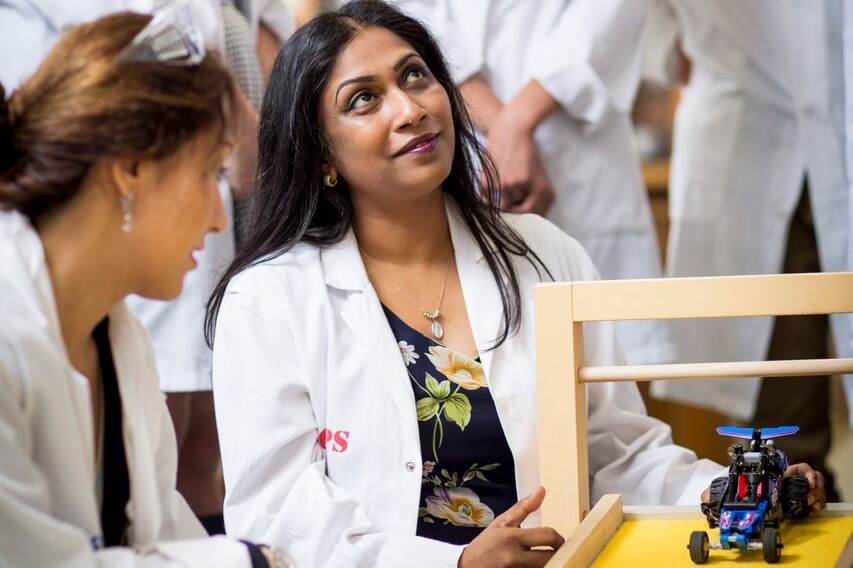
Flinders University’s commitment to engage early with young girls about career choices in Science, Technology, Engineering and Mathematics (STEM) through the STEM Enrichment Academy is having encouraging results.
This program targeting Year 9 female students and their teachers will see around 140 South Australian girls learn about the benefits and opportunities of STEM studies through workshops, industry engagement and mentoring throughout the two-year project. The next event is a teacher-focused Professional Development forum at Flinders University’s Bedford Park campus on Friday 7 December.
Dr Maria Parappilly is director of the two-year STEM Enrichment Academy project, working with Professor Claire Lenehan, Professor David Day and Julie Herraman, which has been made possible by a Federal Government Women in STEM and Entrepreneurship (WISE) Grant.
It aims to encourage young women to consider careers in STEM by engaging them in informative and inspiring activities that underline the benefits and opportunities of STEM studies, before they close off their options at high school. The program’s workshops are also notable for involving the input of many inspiring female graduates, early stage researchers, PhD candidates and STEM experts, who are committed to up-skilling the STEM teaching workforce.
The project has already hosted two significant student-focused events. A full-day workshop in the Science Innovation Learning Centre and Flinders science laboratories focused on making science real for Year 9 girls on 29 October, with 44 participants from four schools. They enjoyed Dr Olivia Samardzic, a Flinders alumna from the SA Space School, and her colleague Dr Alex Sabella delivering a cool demonstration with optical effects to explore the science of light.
Dr Samardzic started the South Australian Space School after she noticed a decline in the number of students taking up physics. “Space captures people’s imagination. It’s a broad field, covering subjects such as space law, policy, medicine and obviously a lot of engineering and physics.”
Dr Samardzic says she is delighted to be taking an active role in the STEM academy. “You first need to turn students on to science and physics, then encourage them to stick to it,” she says. “STEM is all about the joy of discovery, that feeling which is hard to compare to anything else – giving birth to an idea and seeing it through to fruition.”
Students at the October workshop also participated in LEGO physics, and Dr Justin Chalker, STEM educator of the year, talked about Laying Waste to Pollution through his use of chemistry to make new materials from waste that help protect the environment.
“I saw a lot of the students smiling,” said Dr Samardzic. “In 10 minutes, you can change how someone feels about something, and you can only do that by showing your true love for the subject. When students see someone who loves doing what they do, then their attitude can change very quickly.”
A second workshop on 20 November at Tonsley had a design and technology focus, attended by students from four different schools. It included a robotic engineering challenge, a workshop on designing products led by Associate Professor Sandy Walker and Dr Sherry Randhawa, and a panel discussion on biomedical and engineering research and industrial design.
“Inspiring our future designers and thinkers with passion for creative ideas will increase a diverse community at Flinders,” says furniture design specialist and panel presenter Deb Wallace. “I hope that creative thinking can then elevate management courses, manufacturing and engineering, so that we can celebrate many successful stories in the future”
Now the project’s emphasis changes, with a teacher-focused Professional Development event on Friday 7 December, at the Bedford Park campus Physical Sciences Building. It will feature international keynote speaker Professor Chandralekha Singh, who is a professor in the Department of Physics and Astronomy at the University of Pittsburgh, an APS fellow and the Founding Director of the Discipline-Based Science Education Research Centre.
Dr Parappilly, who is also founder of the STEM Women Branching Out Group that develops unique programs for Flinders STEM and high school students, is delighted that the STEM Enrichment Academy project has had an immediate effect.
“Despite considerable focus on the importance of STEM subjects, young women need to be encouraged to consider careers in disciplines such as physics and engineering, which see continued low participation rates at university,” says Dr Parappilly.
The outcomes of the STEM Enrichment Academy project will help inform a broader study on girls in STEM in Australia.

